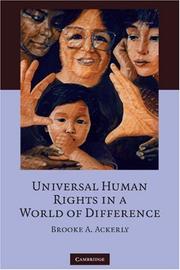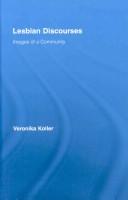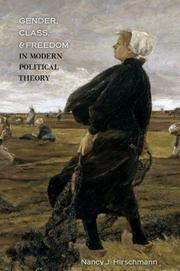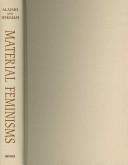| Listing 1 - 10 of 16 | << page >> |
Sort by
|
Book
ISBN: 1435658639 9781435658639 0791478300 9780791478301 Year: 2008 Publisher: Albany State University of New York Press
Abstract | Keywords | Export | Availability | Bookmark
 Loading...
Loading...Choose an application
- Reference Manager
- EndNote
- RefWorks (Direct export to RefWorks)
Traditionally, women's eating disorders are thought to be strongly influenced by media images idealizing a normative thin female body. Taking a different approach, The Anorexic Self critically examines diagnostic and popular discourses on anorexia that construct narrow and ideal notions of the female self. Paula Saukko analyzes the personal and political implications of discourses on the anorexic self in multiple contexts, including her own experience of being diagnosed anorexic; psychiatrist Hilde Bruch's postwar research on anorexia; and media coverage of Karen Carpenter, Princess Diana, and other women with eating disorders. Saukko traces the history of the discourses from postwar idealization of masculine autonomy to postindustrial valorization of feminine flexibility, and also explores their politically progressive and psychologically healing—as well as sexist and humiliating—dimensions. Drawing on narrative therapy, dialogic theory, and multisited ethnography, The Anorexic Self cultivates a less judgmental and more self-reflexive way of relating to ourselves, others, and societies in which we live.
Anorexia nervosa --- Feminist theory. --- Discourse analysis. --- Feminist theory --- Discourse analysis --- Psychiatry --- Health & Biological Sciences --- Psychiatric Disorders, Individual --- Discourse grammar --- Text grammar --- Semantics --- Semiotics --- Feminism --- Feminist philosophy --- Feminist sociology --- Theory of feminism --- Social aspects. --- Social aspects --- Philosophy

ISBN: 9780521707558 9780521881265 0521881269 0521707552 9780511756016 0511409486 9780511409486 9780511410024 0511410026 0511756011 9786611717193 6611717196 9780511407383 0511407386 1107184908 1281717193 0511408137 0511408943 9781107184909 9781281717191 9780511408137 9780511408946 Year: 2008 Publisher: Cambridge Cambridge University Press
Abstract | Keywords | Export | Availability | Bookmark
 Loading...
Loading...Choose an application
- Reference Manager
- EndNote
- RefWorks (Direct export to RefWorks)
From the diverse work and often competing insights of women's human rights activists, Brooke Ackerly has written a feminist and a universal theory of human rights that bridges the relativists' concerns about universalizing from particulars and the activists' commitment to justice. Unlike universal theories that rely on shared commitments to divine authority or to an 'enlightened' way of reasoning, Ackerly's theory relies on rigorous methodological attention to difference and disagreement. She sets out human rights as at once a research ethic, a tool for criticism of injustice and a call to recognize our obligations to promote justice through our actions. This book will be of great interest to political theorists, feminist and gender studies scholars and researchers of social movements.
Human rights --- Human Rights --- Feminist theory --- Feminist theory. --- Human rights. --- Feminism --- Feminist philosophy --- Feminist sociology --- Theory of feminism --- Basic rights --- Civil rights (International law) --- Rights, Human --- Rights of man --- Human security --- Transitional justice --- Truth commissions --- Philosophy --- Law and legislation --- Social Sciences --- Political Science
Book
ISBN: 9781904385929 1904385923 9781904385103 1904385109 9780203891278 0203891279 9781135331009 9781135331047 9781135331054 Year: 2008 Publisher: New York Routledge
Abstract | Keywords | Export | Availability | Bookmark
 Loading...
Loading...Choose an application
- Reference Manager
- EndNote
- RefWorks (Direct export to RefWorks)
Feminist theory. --- Postmodernism --- Women --- Social aspects. --- Violence against. --- Foucault, Michel, --- Influence. --- Feminist theory --- Feminism --- Feminist philosophy --- Feminist sociology --- Theory of feminism --- Human females --- Wimmin --- Woman --- Womon --- Womyn --- Females --- Human beings --- Femininity --- Social aspects --- Violence against --- Philosophy --- Foucault, Michel --- Fūkūh, Mīshīl, --- Foucault, Michael, --- Fuko, Mišel, --- Pʻukʻo, --- Pʻukʻo, Misyel, --- Phoukō, Misel, --- Fuke --- 福柯 --- Fuḳo, Mishel, --- Women Violence against
Book
ISBN: 0814785166 0814720293 9780814720295 9780814785164 9780814719985 0814719988 Year: 2008 Publisher: New York New York University Press
Abstract | Keywords | Export | Availability | Bookmark
 Loading...
Loading...Choose an application
- Reference Manager
- EndNote
- RefWorks (Direct export to RefWorks)
2009 Choice Outstanding Academic Title Elizabeth Cady Stanton (1815-1902) was not only one of the most important leaders of the nineteenth century women’s rights movement but was also the movement’s principal philosopher. Her ideas both drew from and challenged the conventions that so severely constrained women’s choices and excluded them from public life. In The Political Thought of Elizabeth Cady Stanton, Sue Davis argues that Cady Stanton’s work reflects the rich tapestry of American political culture in the second half of the nineteenth century and that she deserves recognition as a major figure in the history of political ideas. Davis reveals the way that Cady Stanton’s work drew from different political traditions ranging from liberalism, republicanism, inegalitarian ascriptivism, and radicalism. Cady Stanton’s arguments for women’s rights combined approaches that in contemporary feminist theory are perceived to involve conflicting strategies and visions. Nevertheless, her ideas had a major impact on the development of the varieties of feminism in the twentieth century. Thoroughly researched and engagingly written, The Political Thought of Elizabeth Cady Stanton draws on a wide variety of primary and secondary sources and promises to fill a gap in the literature on the history of political ideas in the United States as well as women’s history and feminist theory.
Feminist theory --- Women's rights --- Suffrage --- Feminism --- Feminist philosophy --- Feminist sociology --- Theory of feminism --- Franchise --- Right to vote --- Voting rights --- Political rights --- Plebiscite --- Representative government and representation --- Voting --- History --- Philosophy --- Law and legislation --- Stanton, Elizabeth Cady, --- Cady, Elizabeth, --- Stanton, Lizzie, --- Stanton, E. Cady --- Draws. --- century. --- important. --- leaders. --- most. --- movement. --- nineteenth. --- primary. --- rights. --- secondary. --- sources. --- story. --- tell. --- variety. --- wide. --- womens.
Book
ISBN: 128187907X 9786611879075 1848133421 9781848133426 9781281879073 6611879072 9781842779798 1842779796 9781842779804 184277980X 1350222348 Year: 2008 Publisher: London, England : [London, England] : Zed Books, Bloomsbury Publishing,
Abstract | Keywords | Export | Availability | Bookmark
 Loading...
Loading...Choose an application
- Reference Manager
- EndNote
- RefWorks (Direct export to RefWorks)
Following on from the seminal The Man Question in International Relations this book looks at the increasingly violent and 'toxic' nature of world politics post 9/11.
International relations --- Masculinity --- Feminism. --- Feminist theory. --- Violence. --- Emancipation of women --- Feminist movement --- Women --- Women's lib --- Women's liberation --- Women's liberation movement --- Women's movement --- Social movements --- Anti-feminism --- Masculinity (Psychology) --- Sex (Psychology) --- Men --- Political psychology --- Violent behavior --- Social psychology --- Feminism --- Feminist philosophy --- Feminist sociology --- Theory of feminism --- Psychological aspects. --- Political aspects. --- Emancipation --- Philosophy
Book
ISBN: 1283062127 9786613062123 0822381184 0822342596 0822342820 Year: 2008 Publisher: Durham : Duke University Press,
Abstract | Keywords | Export | Availability | Bookmark
 Loading...
Loading...Choose an application
- Reference Manager
- EndNote
- RefWorks (Direct export to RefWorks)
A preeminent science studies scholar shows how feminist and postcolonial science studies challenge the problematic modernity versus tradition binary.
Science --- Technology --- Philosophy --- Civilization, Modern. --- Women in science. --- Feminist theory. --- Technology and civilization --- Normal science --- Philosophy of science --- Science and society --- Sociology of science --- Feminism --- Feminist philosophy --- Feminist sociology --- Theory of feminism --- Minorities in science --- Modern civilization --- Modernity --- Civilization --- Renaissance --- Social aspects. --- Philosophy. --- History. --- History

ISBN: 9780415960953 0415960959 9780203928691 9781135900458 9781135900496 9781135900502 9780415883894 Year: 2008 Volume: 9 Publisher: New York Routledge
Abstract | Keywords | Export | Availability | Bookmark
 Loading...
Loading...Choose an application
- Reference Manager
- EndNote
- RefWorks (Direct export to RefWorks)
#KVHA:Taalkunde --- #KVHA:Discourse analysis --- #KVHA:Gender --- #KVHA:Lesbian discourse --- #KVHA:Homosexualiteit --- Feminisme en lesbianisme --- Lesbianisme --- discoursanalyse --- discourse analysis --- taalgebruik --- Feminisme en lesbianisme. --- discoursanalyse. --- discourse analysis. --- taalgebruik. --- Gay and lesbian studies --- Lesbian feminist theory --- Lesbianism --- Female homosexuality --- Lesbian love --- Sapphism --- Homosexuality --- Women --- Lesbian feminism --- Lesbian feminist sociology --- Theory of lesbian feminism --- Feminist theory --- Gay studies --- Homophile studies --- Lesbian and gay studies --- Lesbian studies --- Education --- Sexual behavior --- Philosophy --- Curricula

ISBN: 9780691129891 9780691129884 Year: 2008 Publisher: Princeton Princeton university press
Abstract | Keywords | Export | Availability | Bookmark
 Loading...
Loading...Choose an application
- Reference Manager
- EndNote
- RefWorks (Direct export to RefWorks)
Liberty --- Constructivism (Philosophy) --- Sex role --- Women's rights --- Social classes --- Feminist theory --- Liberté --- Constructivisme (Philosophie) --- Rôle selon le sexe --- Femmes --- Classes sociales --- Théorie féministe --- Philosophy --- Political aspects --- Philosophie --- Aspect politique --- Droits --- Liberté --- Rôle selon le sexe --- Théorie féministe --- Rights of women --- Women --- Human rights --- Class distinction --- Classes, Social --- Rank --- Caste --- Estates (Social orders) --- Social status --- Class consciousness --- Classism --- Social stratification --- Feminism --- Feminist philosophy --- Feminist sociology --- Theory of feminism --- Civil rights --- Law and legislation --- Legal status, laws, etc.

ISBN: 9780415219747 9780415219754 9780203931905 0415219752 0415219744 9781134601295 9781134601332 9781134601349 Year: 2008 Publisher: London Routledge
Abstract | Keywords | Export | Availability | Bookmark
 Loading...
Loading...Choose an application
- Reference Manager
- EndNote
- RefWorks (Direct export to RefWorks)
Judith Butler's work on gender, sexuality, identity, and the body has proved massively influential across a range of academic disciplines in the humanities and social sciences. Yet it is also notoriously difficult to access.This key book provides a comprehensive introduction to Butler's work, plus a critical examination of it and its precursors, both feminist (including Simone de Beauvoir, Monique Wittig, Julia Kristeva and Luce Irigaray), and non-feminist (including Erving Goffman, Michel Foucault, Jacques Lacan, and Jacques Derrida). The volume covers such topics as: gender as performance and performativity ; sociological notions of performance ; the materiality of the body and the role of biology ; power, identity and social regulation ; subjectivity, agency and feminist political practice. A comprehensive introduction to Butler’s work, this book also covers melancholia and gender identity, hate speech, pornography and 'race', social change and transformation, and Butler’s shifting relation to psychoanalysis.Clearly laid out to cover key themes for a student audience, this text will be an essential read for undergraduates in the fields of gender, psychoanalysis and sociology.
Feminist theory. --- Sex role --- Théorie féministe --- Rôle selon le sexe --- Philosophy. --- Philosophie --- Butler, Judith, --- Criticism and interpretation. --- #SBIB:316.346H00 --- #SBIB:613.88H10 --- Man-vrouw-studies, gender: algemeen --- Seksualiteit: algemeen --- Théorie féministe --- Rôle selon le sexe --- Feminist theory --- Gender role --- Sex (Psychology) --- Sex differences (Psychology) --- Social role --- Gender expression --- Sexism --- Feminism --- Feminist philosophy --- Feminist sociology --- Theory of feminism --- Philosophy --- Gender roles --- Gendered role --- Gendered roles --- Role, Gender --- Role, Gendered --- Role, Sex --- Roles, Gender --- Roles, Gendered --- Roles, Sex --- Sex roles

ISBN: 0253013607 9780253013606 9780253349781 0253349788 9780253219466 0253219469 Year: 2008 Publisher: Bloomington, Ind. Indiana University Press
Abstract | Keywords | Export | Availability | Bookmark
 Loading...
Loading...Choose an application
- Reference Manager
- EndNote
- RefWorks (Direct export to RefWorks)
Harnessing the energy of provocative theories generated by recent understandings of the human body, the natural world, and the material world, Material Feminisms presents an entirely new way for feminists to conceive of the question of materiality. In lively and timely essays, an international group of feminist thinkers challenges the assumptions and norms that have previously defined studies about the body. These wide-ranging essays grapple with topics such as the material reality of race, the significance of sexual difference, the impact of disability experience, and the complex interaction between nature and culture in traumatic events such as Hurricane Katrina. By insisting on the importance of materiality, this volume breaks new ground in philosophy, feminist theory, cultural studies, science studies, and other fields where the body and nature collide.
Human body. --- Feminist theory. --- Body, Human --- Human beings --- Body image --- Human anatomy --- Human physiology --- Mind and body --- Feminism --- Feminist philosophy --- Feminist sociology --- Theory of feminism --- Philosophy --- Etnicitet. --- Feminismus. --- Feministisk teori --- Feministisk teori. --- Kropp. --- Körper. --- Naturkatastrofer --- Utvecklingslära --- Filosofi --- Beteende --- Könsolikheter. --- Feminism. --- Political philosophy. Social philosophy --- Philosophical anthropology --- Materialism. --- Physicalism --- Animism --- Positivism --- Dualism --- Idealism --- Mechanism (Philosophy) --- Monism --- Realism --- Feminist Ethics --- Ethics, Feminist --- Women's Rights --- Nature --- Body --- Theory --- Biotechnology --- Book
| Listing 1 - 10 of 16 | << page >> |
Sort by
|

 Search
Search Feedback
Feedback About UniCat
About UniCat  Help
Help News
News